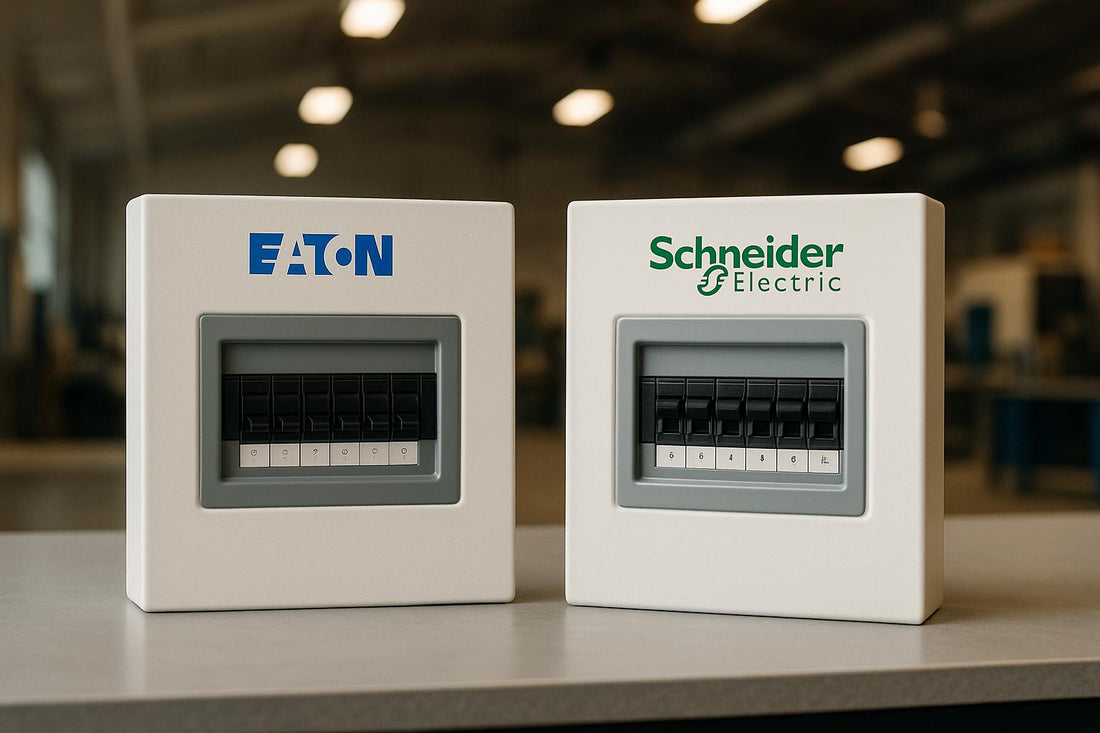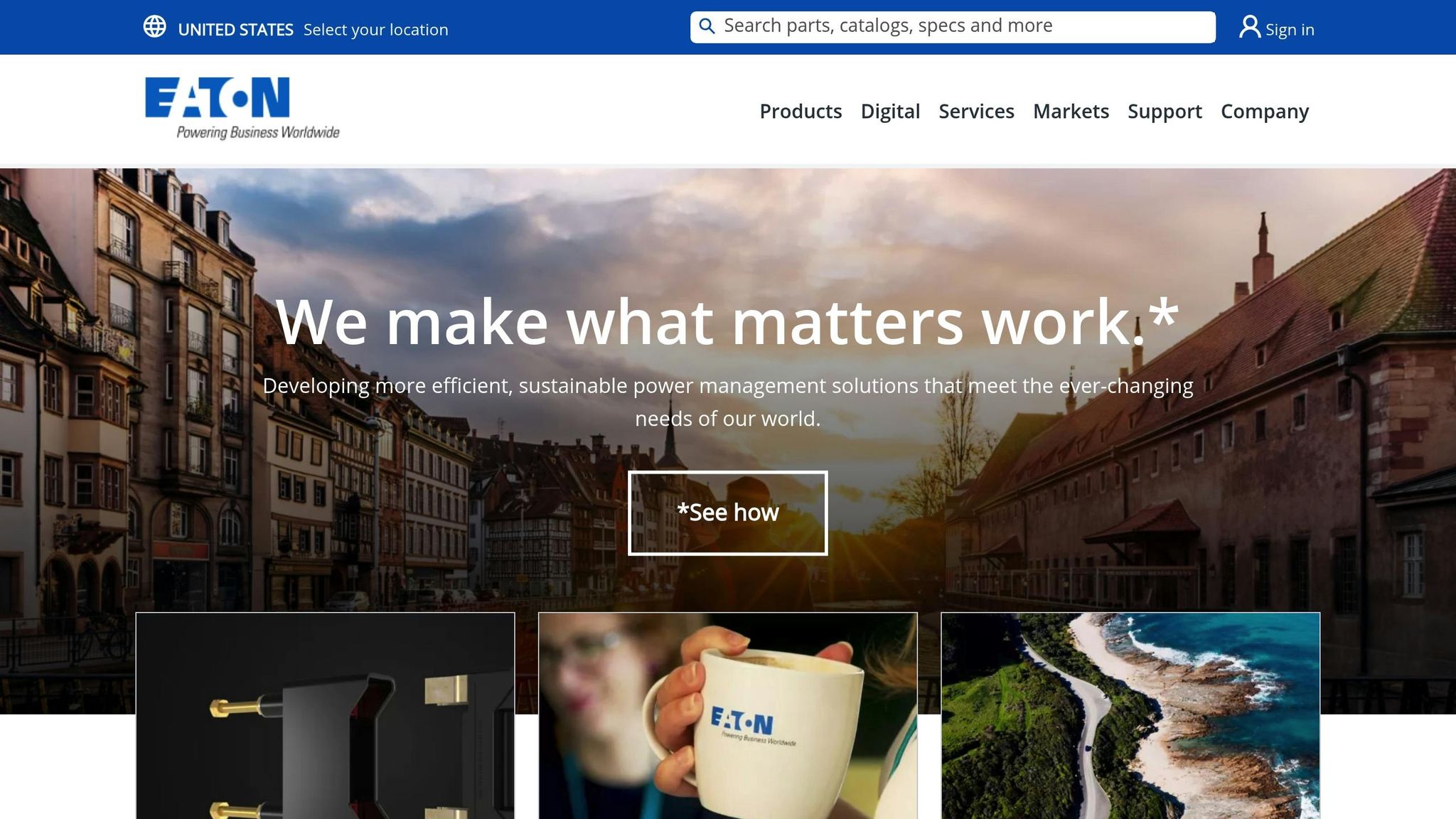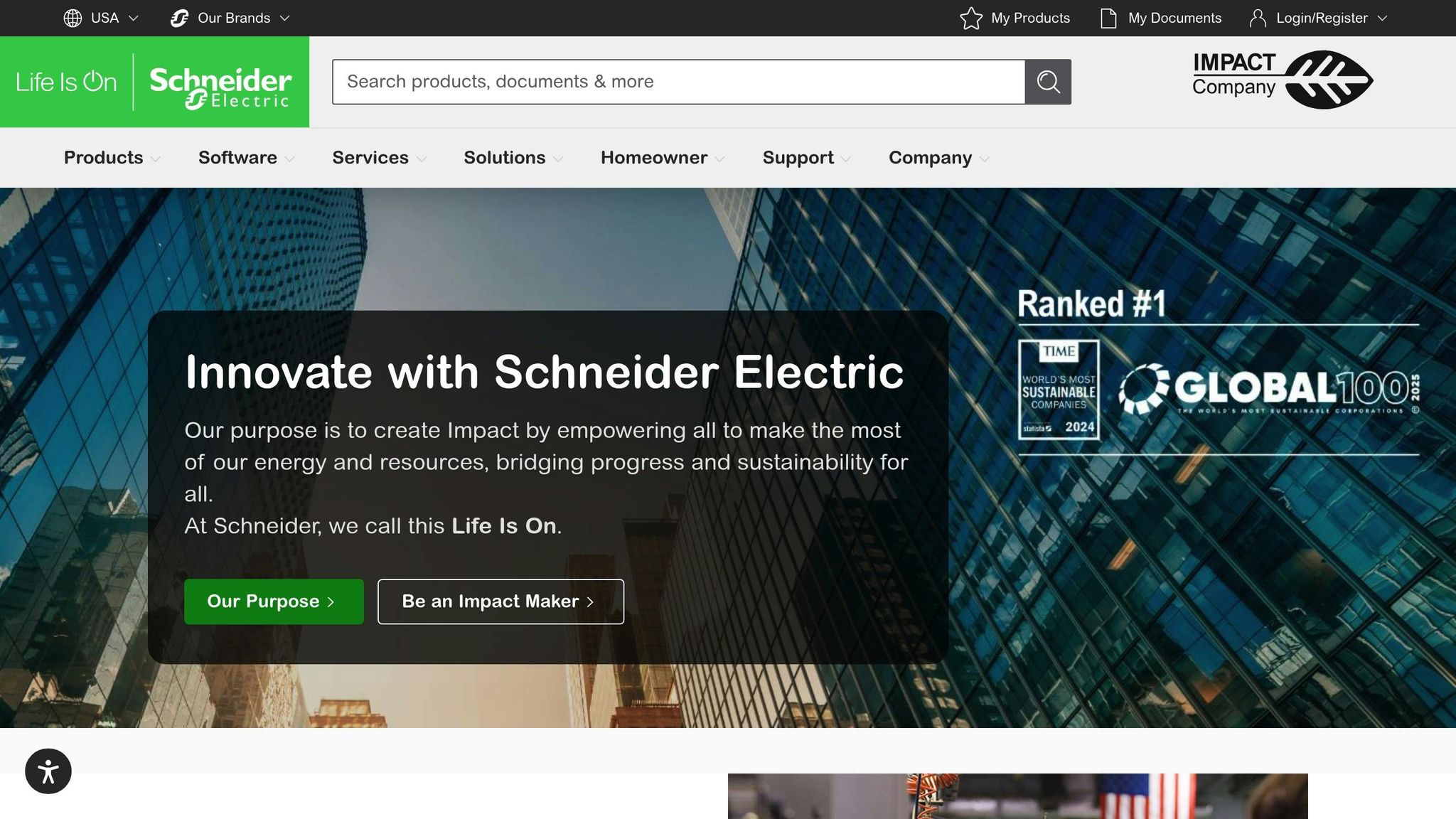
Eaton vs. Schneider: Warranty and Support Comparison
Share
When deciding between Eaton and Schneider Electric for electrical equipment, the choice often comes down to warranty and support. Here's a quick breakdown:
- Eaton: Offers warranties ranging from 6 months to lifetime, with robust customer support via EatonCare. Known for quick response times and effective service for critical power systems. Higher price point but strong reliability.
- Schneider Electric: Standard warranties span 18 to 120 months, with extended options up to 10 years. Support includes the mySchneider app and regional centers. More affordable but mixed reviews, especially for APC products.
Quick Comparison
| Feature | Eaton | Schneider Electric |
|---|---|---|
| Warranty Length | 6 months to lifetime | 18 to 120 months |
| Support Quality | Strong service network | Accessible, but mixed reviews |
| Price Range | Higher | More affordable |
| Best For | Critical systems, fast service | Budget-conscious buyers |
Eaton is ideal if reliability and service are top priorities. Schneider Electric suits those seeking affordability with basic support.
Eaton Warranty and Support Services

Eaton provides a well-rounded warranty and support system, designed to protect your investments and ensure the reliability of their products. Their approach caters to a wide range of electrical equipment, from basic circuit protection devices to advanced power management systems.
Eaton Warranty Options
Eaton offers a variety of warranty plans tailored to different product types and applications, with coverage periods ranging from 6 months to lifetime warranties. Most products fall under a 1–5 year warranty window. For uninterruptible power supplies (UPS), the standard units with VRLA batteries typically include 2- or 3-year warranties, while lithium-ion UPS systems up to 3 kVA come with a 5-year standard warranty.
In 2023, Eaton expanded its warranty offerings by introducing a 5-year warranty for its new IT and edge computing UPS series, covering both the unit and its internal batteries.
Products under the Crouse-Hinds line generally come with a 12-month standard warranty from the shipment date, though some exceptions apply. Customers purchasing UPS products through Electrical Trader can unlock extended warranties by registering their equipment, gaining additional coverage for both the unit and its batteries.
| Warranty Length | Product Type Examples |
|---|---|
| 12 Months | Crouse-Hinds products |
| 2–3 Years | Standard UPS systems with VRLA batteries |
| 5 Years | Lithium-ion UPS systems (up to 3 kVA) |
| Lifetime | Coverage for select products (refer to the product manual) |
Eaton Customer Support
Eaton’s customer support is anchored by EatonCare, a platform that provides technical resources, project guidance, and emergency assistance. The company ensures easy access to expertise through multiple contact channels.
"At Eaton, it's important that we not only provide industry-leading products, but also the best support in the industry."
For general inquiries in the U.S., Eaton offers a toll-free support line at 1-800-386-1911. Their Technical Resource Center assists with product selection, troubleshooting, and application advice across various categories, such as circuit protection and power distribution.
Eaton also provides 24/7 emergency support through its electrical engineering services team at 1-800-498-2678. UPS-specific issues can be addressed via their dedicated support line at 1-800-843-9433. Additionally, the MyEaton Global Support Center operates around the clock for account-related help, and customers with variable frequency drives can contact the Drives Technical Resource Center at 877-ETN-CARE (386-2273).
"You can count on our community of experts to help you answer technical or commercial questions. Our support teams are dedicated to providing the answers you need when you need them."
Eaton Warranty Requirements
To make a warranty claim, Eaton requires specific documentation and adherence to their procedures. Claims must be initiated by the original purchaser and approved by Eaton Customer Service. Failed components must be retained for 60 days to allow for inspection.
Before authorizing returns, Eaton typically conducts remote diagnostics over the phone, via email, or through remote troubleshooting. For commercial vehicle applications, claims must be filed within 90 days of failure, with evidence of material or workmanship defects. Required documentation includes driver complaints, component details (model and serial numbers), VIN, mileage, and in-service dates.
All failed parts must be returned to Eaton for analysis to determine the root cause of the issue.
"Eaton MAKES NO WARRANTIES OTHER THAN THE LIMITED WARRANTY EXPRESSLY SET FORTH HEREIN. EXCEPT TO THE EXTENT PROHIBITED BY APPLICABLE LAW, ALL IMPLIED WARRANTIES, INCLUDING ALL WARRANTIES OF MERCHANTABILITY OR FITNESS FOR A PARTICULAR PURPOSE, ARE HEREBY DISCLAIMED."
For extended warranty coverage on lubrication-related failures, proof of synthetic lubricant use and maintenance records showing scheduled changes are necessary. As Eaton emphasizes, "Knowing and understanding the warranty is the responsibility of the vehicle owner".
Next, we’ll delve into Schneider Electric’s warranty and support system to provide a side-by-side comparison.
Schneider Electric Warranty and Support Services

Schneider Electric provides warranty coverage and support options tailored to meet the needs of U.S. customers. These offerings are designed to accommodate a variety of product categories and requirements, creating a flexible framework that emphasizes customer care. While similar to Eaton's approach, Schneider Electric’s warranty and support services stand out with their own unique features and options.
Schneider Electric Warranty Options
Schneider Electric’s standard warranties vary by product type, ranging from 18 months to 120 months. For instance:
- The ION8650 Series comes with a 120-month warranty.
- The ION7400, ION9000, PM5000, and PM8000 Series include a 60-month warranty.
- Most other product lines, such as the 3020 Series, BCPM Series, CM4000T Series, and various EM Series meters, are covered for 18 months.
In addition to these standard warranties, Schneider Electric offers extended warranty options:
- 2–5 years of additional coverage.
- 6–10 years of extended coverage.
- A premium extension providing up to 10 years of coverage from the shipment date.
These extended plans include perks like repair or replacement services, round-the-clock customer support, and expedited shipment of replacement units [20, 19]. For single-phase UPS systems, customers can choose an extra one or three years of coverage. Schneider Electric’s Industrial Repair Services also back standard repairs and reconditioned units with a 12-month warranty, covering defects in workmanship and materials. Customers receive a Service Warranty Certificate via email, which outlines service registration and expiration details.
| Product Series | Standard Warranty | Extended Options Available |
|---|---|---|
| ION8650 Series | 120 months | None |
| ION7400/9000, PM5000/8000 Series | 60 months | 6–10 years; Premium 10 years |
| Most EM Series, 3020, BCPM Series | 18 months | 2–5 years |
Schneider Electric Customer Support
Schneider Electric takes customer support seriously, offering assistance through a variety of channels. Customers can access technical support, customer service, and complaint resolution via dedicated contact centers [23, 24]. The mySchneider app adds convenience by providing direct access to local experts through contact forms, live chat, and phone support. For Process Automation products, specialized regional support centers are available to handle complex industrial applications. Schneider Electric emphasizes its commitment to being available anytime, anywhere [23, 24].
Schneider Electric Service Limitations
While Schneider Electric’s warranty coverage is extensive, there are some important limitations to note:
- Exclusions: Design defects, guarantees of uninterrupted operation, and normal wear and tear are not covered.
- Labor Costs: Expenses related to removing or installing defective products are not included.
- Serial Numbers and Cosmetic Issues: Products with missing or unreadable serial numbers or cosmetic damage are not eligible for coverage. Regulatory compliance issues and consumable components (e.g., fuses, fans) are also excluded.
- Connectivity Requirements: Products requiring connectivity must maintain a continuous internet connection via the Schneider Home app. Connectivity issues are not covered.
- Improper Use: Failures caused by unauthorized modifications, misuse, unsuitable environments, or external events like fire, flood, or lightning are excluded. Additionally, Schneider Electric products are not intended for life-support systems or other critical applications where failure could lead to injury or death.
- Financial Limitations: Coverage is limited to the price paid for the product (where permitted by law). The company does not cover incidental, punitive, or consequential damages, including lost profits or revenue.
- Specialized Products: For products like the Schneider Boost Battery (10 kWh), coverage lasts for ten years from commissioning or until 30 MWh throughput, whichever comes first.
Eaton vs Schneider Electric Comparison
When deciding between Eaton and Schneider Electric, warranty and support services often play a critical role. Both manufacturers provide extensive programs, but their strengths cater to different needs and budgets.
Pricing is one of the most noticeable differences. Eaton’s circuit breakers are generally priced higher than Schneider Electric’s Square D products, reflecting their incorporation of advanced features and technologies. Meanwhile, Schneider Electric is often praised for offering more competitive pricing while still maintaining reliable support services.
Support quality also sets these two brands apart. Eaton is frequently recognized for its strong service organization and effective customer relationships. Schneider Electric, on the other hand, is appreciated for its accessible support, though some customers have noted that more proactive engagement from the company could enhance their experience.
When it comes to brand performance and customer satisfaction, Schneider Electric leads in global brand ranking (#364 compared to Eaton’s #960). It also holds a slight edge in Net Promoter Score, scoring 32 versus Eaton’s 27. For data center power solutions, Eaton’s UPS systems have an average rating of 9.0 based on 14 reviews, while Schneider Electric’s APC Smart-UPS VT averages 8.2 based on 5 reviews.
Warranty and Support Comparison Table
Here’s a quick breakdown of how Eaton and Schneider Electric compare in terms of warranty and support:
| Feature | Eaton | Schneider Electric |
|---|---|---|
| Premium Features | Advanced features, strong service | Competitive pricing, broad product range |
| Support Quality | Effective customer service | Accessible but could improve proactivity |
| Global Brand Ranking | #960 | #364 |
| Net Promoter Score | 27 | 32 |
| Best For | Advanced features and robust service | Budget-conscious buyers with basic needs |
If you prioritize advanced features and a strong service network, Eaton may be the better choice. For those focused on affordability and straightforward support, Schneider Electric could be the ideal fit.
sbb-itb-501186b
Customer Reviews and Experiences
Customer feedback paints a varied picture of warranty claims and support when comparing Eaton and Schneider Electric. While both companies have their strengths, the experiences customers report can differ widely depending on the product line and the specific support team they interact with.
Warranty Claims Experience
APC by Schneider Electric has faced notable criticism regarding its warranty claims process. On Trustpilot, the division holds a low rating of 1.7 out of 5 stars, based on 42 reviews, with 74% of those reviews being 1-star ratings.
In October 2024, an electrical engineer named Stewie shared his frustrating experience with APC's warranty process. His APC Back-Ups Pro, which was less than a year old, began malfunctioning. When he contacted support for warranty coverage, he was informed that the unit was considered four years old, effectively voiding the warranty under the Magnuson-Moss Warranty Act of 1975. Left without options, Stewie ended up repairing the unit himself, highlighting significant shortcomings in APC's claims handling.
Response times have also been a recurring issue. Several customers have reported delays and inadequate follow-ups. Aaron Lee, a customer who voiced his frustration in May 2025, shared:
"The product is good but customer service is terrible; they provide irrelevant answers and close conversations without proper resolution."
These examples illustrate the challenges many customers face with APC's warranty support, contrasting sharply with the experiences reported for Eaton.
When Each Brand Performs Best
Despite APC's struggles with warranty claims, customer satisfaction varies across Schneider Electric's product lines. Eaton's warranty support, for instance, has received mixed feedback. While some users have reported difficulties with initial contact, those who manage to connect with Eaton's technical team often receive fast and effective assistance. One reviewer even rated Eaton's support a perfect 10 out of 10, noting that service tickets typically result in onsite visits within just one to two hours. This level of responsiveness makes Eaton a strong contender for customers with critical power infrastructure needs.
Within Schneider Electric, the performance also varies by product line. While APC has its challenges, the Square D division receives much better feedback. For example, the Square D HEPD50 has earned a 4.6 out of 5 stars rating on Amazon from 175 reviews, with customers praising its ease of installation, durable construction, and reliable surge protection. Similarly, Schneider Electric's Smart-UPS VT line is recognized for its accessible and responsive customer support, particularly when addressing standard electrical distribution issues.
For customers weighing their options, it’s important to note these differences. APC's warranty support may have significant limitations, but Schneider Electric's other product lines, such as Square D and Smart-UPS VT, offer a more reliable experience. Eaton, on the other hand, stands out for its quick and effective onsite support, making it a solid choice for those managing critical systems. Understanding these nuances can help buyers make more informed decisions, particularly when shopping through platforms like Electrical Trader. These insights align with earlier observations on warranty coverage and support responsiveness, offering valuable guidance for potential purchasers.
Summary
When deciding between electrical equipment from Eaton or Schneider Electric, it’s essential to align your choice with your priorities and budget. Both brands provide solid warranty coverage, but their customer support experiences can vary depending on the product line.
Eaton's UPS systems stand out for their reliable service and deployment support. For example, Eaton's UPS holds a 9.0 rating from 14 reviews, with a 100% recommendation rate. It also leads the Data Center Power Solutions category with a 37.1% mindshare as of July 2025.
Schneider Electric, on the other hand, shows mixed results in customer support across its divisions. The Schneider Electric-APC Smart-UPS VT has an average rating of 8.2 based on customer feedback. However, Schneider Electric USA Inc. has a D- rating from the Better Business Bureau, citing responsiveness issues.
For professionals in the U.S., your decision should be guided by your operational priorities. If avoiding downtime is critical, Eaton’s strong support services may justify its higher price point. On the other hand, if budget is a key factor and advanced features are less of a priority, Schneider Electric’s offerings, like its Square D line, may provide good value. When shopping on platforms like Electrical Trader, take the time to review detailed product specifications and support terms, as support quality can vary even within the same brand.
Ultimately, your decision should focus on the specific support performance and product features that match your operational needs. Carefully examine product details and support policies to ensure you’re making a well-informed investment.
FAQs
How do Eaton and Schneider Electric compare in terms of warranty and support services?
When it comes to warranty and support services, Eaton and Schneider Electric each bring something different to the table, and these differences could sway your decision.
Eaton is well-regarded for its detailed warranties and wide-ranging support services. If you're looking for a provider that offers strong service agreements and ongoing technical help, Eaton might be the better match.
Schneider Electric, by contrast, focuses on reliable service paired with simpler warranty options. This approach could be ideal for users who prefer standard protection without the extras.
In short, Eaton shines with its expansive support network, while Schneider Electric delivers solid, straightforward coverage that gets the essentials right.
How do Eaton and Schneider Electric compare in terms of customer support accessibility and effectiveness?
Eaton and Schneider Electric both have strong customer support systems, but they shine in different ways. Eaton is often recognized for its reliable and accessible support, with customers frequently praising how easy it is to connect with their team and how quickly issues are resolved. Many reviews highlight the consistent quality of their service and the dependability of their responses.
Schneider Electric, meanwhile, earns high praise for its technical expertise. Customers value the in-depth knowledge of their support representatives, especially when dealing with complex technical problems. Their team’s ability to handle intricate inquiries often leaves a lasting impression.
In summary, Eaton is celebrated for its steady and responsive support, while Schneider Electric stands out for its deep technical knowledge. Both companies have earned strong reputations, each excelling in its own way.
What factors should I consider when choosing between Eaton and Schneider Electric for critical power systems or budget-friendly solutions?
When choosing between Eaton and Schneider Electric, it all comes down to what you need most.
For critical power systems, Eaton stands out with its strong reputation for reliability, durable construction, and efficiency. It’s a go-to option for situations where performance and long-lasting quality are absolutely essential.
On the flip side, if cost-efficiency is your main focus, Schneider Electric offers budget-friendly solutions with excellent energy management capabilities. These systems work well for projects where affordability matters more, and the power demands aren’t as intense.
To put it simply: go with Eaton for top-tier reliability and Schneider Electric for affordable energy management in less demanding scenarios.
Related posts
- 10 Best Circuit Breakers for Industrial Use
- Ultimate Guide to Low Voltage Equipment
- New vs Used Electrical Equipment: Carbon Footprint
- Metal Clad vs Metal Enclosed Switchgear
